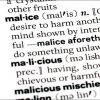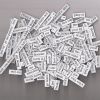-
 +3 +1
+3 +1‘Toxic’ Is Oxford’s Word of the Year. No, We’re Not Gaslighting You.
The word, which is increasingly applied to nonphysical things, beat out others, including “gaslighting,” “incel” and “techlash.”
-
 +27 +1
+27 +1'Open Source' Is Now a Word?
So far there’s been no news on Microsoft’s reaction to “open source” being officially recognized by the arbiters of the English language. “Open source” is now officially a word according to Merriam-Webster, according [...] Continue reading ‘Open Source’ Is Now a Word?
-
 +30 +1
+30 +1Are Dictionaries Prejudiced?
Dictionaries are typically viewed as being value neutral. But they are just as steeped in culture and bias as the rest of the world—and they have the power to shape what we see as “normal.”
-
 +32 +1
+32 +1'Post-truth' declared word of the year by Oxford Dictionaries
Oxford Dictionaries has selected "post-truth" as its 2016 international word of the year.
-
 +9 +1
+9 +1The Top-Trending Words on MerriamWebster.com Will Warm Your Politics-Loving Heart
So America is curious about some things.
-
 +22 +1
+22 +1February 1st 1884 - Oxford Dictionary debuts
The first portion, or fascicle, of the Oxford English Dictionary (OED), considered the most comprehensive and accurate dictionary of the English language, is published. Today, the OED is the definitive authority on the meaning, pronunciation and history of over half a million words, past and present.
-
 +61 +1
+61 +1‘Ism’ is ‘Word of the Year’
Dictionary publisher Merriam Webster said choice made because so many people searched for various 'isms' on their website
-
 +19 +1
+19 +1The Great Failure of Andrew Carnegie’s Simplified Spelling Lobby
In their own quiet way, spelling and grammar are each forms of lobbying. We treat language as an immutable fact, but it started out as a variety of opinions on what things should be called. And those opinions, like a diamond pressed into form, slowly molded into a definitive shape. But even though language started from dissent, there’s a limit to how much dissent we can tolerate... By Ernie Smith.
-
 +42 +1
+42 +1Why You Can’t Use Dictionaries in Court
The Place: All federal and state courtsThe Rule: Jury members cannot consult outside texts or resources – even dictionaries – during deliberation.The Reason: Even if they don’t know the meaning of a word, juries must confine their knowledge of a case to what’s presented in court. While dictionaries might seem like a harmless text, most courts have ruled that consulting one is in fact misconduct because it could color a jury’s decision.
-
 +1 +1
+1 +1Wordnik
Great website you can use to look up definitions for words. Don't bother looking for dictionaries, use Wordnik instead!
-
 +16 +1
+16 +1Chamber Music
Review: ‘The Chambers Dictionary, 13th Edition.’ By Matthew Walther
-
 +9 +1
+9 +124 Brilliant New Words That Must Be Added To A Dictionary
The beautiful thing about language is that it changes to reflect the times. Sometimes we even have to coin our own words and phrases for new things!
-
 +6 +1
+6 +1Yolo and binge-watch added to online dictionary
Yolo, an acronym for 'you only live once', is among the latest new words added to the Oxford online dictionary. The phrase, along with 'adorbs' - meaning cute or adorable, and 'binge-watch' - which means to avidly watch something - has been added to oxforddictionaries.com. The website is a catalogue of current definitions of English words as they are used today.
-
 +24 +1
+24 +1Webster's dictionary adds 'selfie,' 'tweep,' 'turducken'
Selfie, tweep and turducken were among more than 150 new words and definitions added to the 2014 updated Merriam-Webster's Collegiate Dictionary, the publishing company said on Monday. The
-
 +14 +1
+14 +1Why These Booksellers Think They Bought Shakespeare’s Dictionary
Two rare booksellers who reside in New York claim they own an annotated dictionary they believe belonged to the master bard himself, William Shakespeare.
-
 +18 +1
+18 +1Why Procrastinators Procrastinate
Who would have thought that after decades of struggle with procrastination, the dictionary, of all places, would hold the solution. Avoid procrastination. So elegant in its simplicity. While we’re here, let’s make sure obese people avoid overeating, depressed people avoid apathy, and someone please tell beached whales that they should avoid being out of the ocean.
-
 +14 +1
+14 +112 New Words Added to the Oxford English Dictionary in 2013
With last year edging quickly out of view in 2014's rear view mirror, there's still a pivotal part of 2013 logophiles shouldn't be quick to forget: a bumper crop of new words bolstering the Oxford English Dictionary's lexicon. The OED upped its entry count with three updates last year—here's a snapshot retrospective of the words committed to dictionary immortality in 2013.
-
 +7 +2
+7 +2Selfie Is Officially the 2013 Word of the Year
Time to fire up Instagram and party like it's, um, 2013, because 'selfie' has been named the Oxford Dictionaries word of the year.
-
 +11 +3
+11 +3Why 'the' is so difficult to define
It's the most frequent word in the English language, accounting for around four percent of all the words we write or speak. It's everywhere, all the time, so clearly it must be doing something important. Words have meaning. That's fundamental, isn't it? So what does "the," a word that seems to be supporting a significant portion of the entire weight of our language, mean? It must mean something, right?
Submit a link
Start a discussion




















